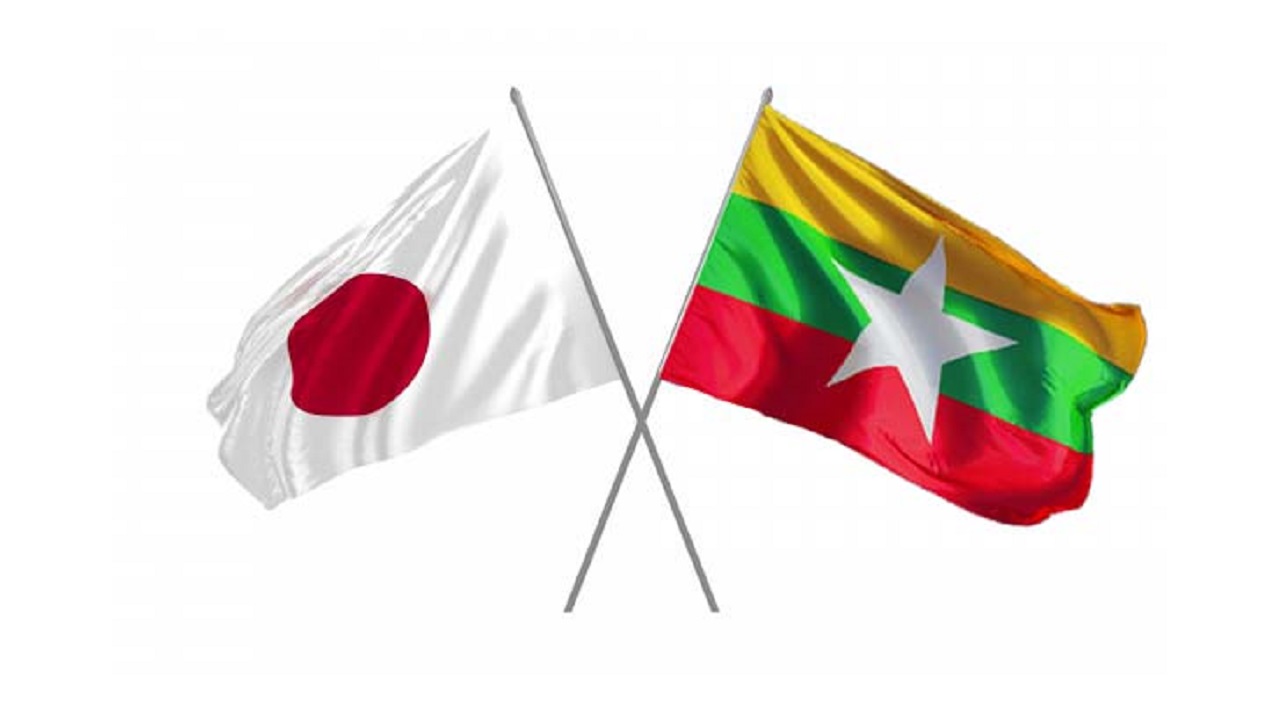Japan and Myanmar established diplomatic relations in 1954. The Japan-Burma Peace Treaty and Agreement on Reparations and Economic Cooperation, 1954 laid the foundations for economic cooperation. The two countries refer to the historical friendly relations, where both have supported each other during crises. In the current political crises, Japan is walking a tight rope on whether to continue with its economic relationship or support the pro-democracy protests in the country and thus take a stand against the military. Japan has taken a pragmatic stance, or rather a strategic diplomatic stance, to preserve its economic and geo-strategic interests in Myanmar.
Japan’s Economic and Strategic Interests in Myanmar
Japan is Myanmar’s sixth-largest direct investor, the third-largest importer of Myanmar products, and the seventh-largest exporter to Myanmar. In addition, major projects such as the development of the Thilawa Special Economic Zone (SEZ) and development projects in Yangon City are underway. The three major objectives of Japan’s Overseas Development Assistance (ODA) to Myanmar are to spread democracy, ensure national reconciliation and bring economic reforms. Major projects under this included, construction of schools in Kanpellet Township, Chin State, upgrading ferryboat in Yangon, strengthening firefighting equipments, capacity development of legal and judicial services, infrastructure developments in Thilawa Area and many others.1
High-level Officials visits have been part of Japan-Myanmar relations. Few landmark visits were Japan’s Prime Minister, Shinzo Abe visit to Myanmar in 2014, and frequent visits of Myanmar’s President U Thein in 2012, 2013, 2015 and President’s U Htin Kyaw in 2017 and Counsellor Aung San Suu Kyi visit to Japan in 2018. Significant developments and cooperation took place during these visits establishing stronger relations between the two countries.
Japan has been aiming to restore peace and security in Myanmar, as stated in its objectives earlier. Japan has taken steps to create the situation of national reconciliation and establishing democratic processes. In November 2020 third general elections, Japan sent an election observer mission headed by Mr Yohei Sasakawa, Special Envoy of the Government of Japan for National Reconciliation in Myanmar. 2 Japan extended its support to improve the situation in Rakhine State and noted the importance of implementing the order on provisional measures issued by the International Court of Justice (ICJ). Japan also brokered a deal between Myanmar military and Arakan Army (AA) to conduct elections in Rakhine. The support was more strategic, as Japan refused to impose any sanctions against any individual or entity.
Japan has also supported Myanmar in the period of humanitarian crises. For example, during the ongoing COVID-19 pandemic, Japan has provided technical assistance, Avigan tablets, and medical supply and equipment assistance equivalent to over USD 30 million to Myanmar. Also, an additional 30 billion yen in emergency budget support and 15 billion yen in ODA loans to support small and medium-sized enterprises (SMEs) in Myanmar was provided to support Myanmar economically. Earlier, during the flood disaster in mid-July, Japan gave two grant aids of approximately JPY 4 billion to Myanmar. Additionally, around JPY 5 billion was sent for the reconstruction of schools and provision of water purification vehicles and machinery for digging wells.
Japan-Myanmar friendship is also in resonance with the Japanese geopolitical interest of countering China and its economic interests. The competition between Chinese and Japanese interests is not new. Earlier during the Japanese Foreign Minister visit to Myanmar in 2019, the two sides discussed regional issues of the South China Sea issue.3
The Current Political Crises and Japan’s Mixed Response
Previously in the 1990s, Japan took a favourable stance toward the Myanmar government and military. Japan refused to impose sanctions, despite the western countries having imposed sanctions. Even after the Rohingya crisis in 2017, many Western nations imposed sanctions on Myanmar and military officials; however, Japan refused to impose any. In October 2019, Japan’s Ministry of Defence invited Min Aung Hlaing, Commander-in-Chief of Myanmar. According to UN Independent International Fact-Finding Mission on Myanmar, he holds maximum responsibility for the crimes in Rakhine State. He is also on the US sanctions list. Despite these accusations, he received a warm welcome from the Japanese government, and met Japanese Prime Minister Shinzo Abe.4
Japan’s initial statement on the internal situation in Myanmar did not mention the words such as a coup or criticised the military actions. Instead, the statement puts the responsibility on the military to restore the democratic political system, who have in reality, destabilised it.5 Japanese Ambassador Ichiro Maruyama called the imposition of sanctions because of Rohingya issue “utter nonsense” and stated Japan’s intention to not impose any sanctions. He further stated Japan’s policy to continue being “good friends” and maintain the economic and political relationships.6
However, mixed responses are reported, as Japan is walking a tight rope as it does not want Myanmar to slip into Chinese shoes, and at the same time has to support democratic forces to keep the close friendship ties with Myanmar people. During the conversation between the Japanese Foreign Minister and Indonesian Foreign Minister on 10 February 2021, the former stated Japan's policy to urge the Myanmar military to refrain from violence against citizens, release those detained, and swiftly restore Myanmar's democratic political system.7 Just before the G7 meeting, a resolution was adopted in the Japanese House of Representatives plenary session, which described the military coup as an “act to trample on efforts and expectations for democratisation” and called on the Japanese government to “make full use of all diplomatic resources and every effort to realise” the restoration of democracy in Myanmar. Therefore, at the G7 meeting, Japan with other members condemned the military coup in Myanmar.8
Nevertheless, Japan has been accused of appeasing the military by continuing to provide aid and grants during the political crises. These grants and loans are feared as the money would go to the Myanmar military, which has been condemned for human rights violations and the overthrow of democratic rule. Such instances have happened before, and therefore, these concerns are likely to remain unresolved. In response to the 2008 Cyclone Nargis, international relief supplies were sent to Myanmar; however, these got confiscated by Myanmar government agencies and military. Earlier, Human Rights Watch and four other organisations sent a letter to Japanese Foreign Minister Motegi urging the Japanese government to stop non-humanitarian ODA programmes to Myanmar.
During this period of crisis, Japan has offered a USD 19 million emergency grant aid for Rohingya refugees and another emergency grant of USD 5.8 million as humanitarian assistance for the people of Myanmar. However, the Japanese ministry clarified that the aid would be provided to the country through international organisations such as the International Committee of the Red Cross, United Nations High Commissioner for Refugees (UNHCR), the World Food Programme (WFP) and not through Myanmar’s military.9
Japanese projects are also under scrutiny. The Y Complex, a redevelopment project, consisting of a hotel, office building and commercial facilities, was being built in Yangon by Japanese contractors Tokyo Tatemono and Fujita. The 16,000-sq.-meter site was previously a military museum and was under the control of Myanmar's Defence Ministry. Justice for Myanmar revealed that the consortium pays more than USD 2.1 million a year to the ministry to lease the plot. Since the military coup, Justice for Myanmar along with other NGOs urged the United Nations to investigate whether funds from Y Complex are financing the Myanmar military activities. The groups also want the project to be suspended until the country comes under the control of a civilian government.
Another project which is facing trouble is the Bago Bridge project to be built across the Bago River. It would be of great significance as it would connect Yangon and the Thilawa Special Economic Zone. The project was awarded to Japan's Yokogawa Bridge and Sumitomo Mitsui Construction in March 2019. However, the Myanmar military-dominated MEC is a subcontractor in the construction of the bridge. After the coup, Yokogawa Bridge reported that it would "consider future steps following a discussion with the Japan International Cooperation Agency and other companies.” However, Sumitomo Mitsui Construction also stated that the MEC was not among the project's subcontractors.10 Other private companies, such as the Japanese car giant Suzuki halted operations at two of its factories in Myanmar and Japan’s Kirin Holdings announced the discontinuance of its two major joint ventures in Myanmar.
Myanmar military’s mixed responses have also created tensions between Japan and Myanmar. For example, on 18 April 2021, a Japanese journalist, Yuki Kitazumi, was arrested and was released after a month by Myanmar’s military following efforts by Japanese diplomats and others. Kitazumi was for “inciting” anti-military civil disobedience and riots and violating visa regulations. Japan also took up the matter with the Myanmar military after security personnel forcibly entered the homes of the Japanese Embassy and aid staff in Yangon in April. Japan’s Chief Cabinet Secretary Katsunobu Kato, stated that the security forces’ actions risked Japanese nationals’ safety, and violated the Vienna Convention on Diplomatic Relations. Later, the Myanmar military government apologised for the incidents at the Japanese Embassy in Yangon.11
Conclusion
Japan’s Diplomatic Bluebook holds that “the stability of Myanmar, which has a historical friendship with Japan, has huge potential for economic development, and geopolitical importance is directly related to stability and prosperity throughout the entire region.”12 It is essential that during the current political crises, the two countries realise the need to resolve the crises with the equal participation of all stakeholders. Appeasing the military over the civilian government gives the wrong message to the Myanmar population and therefore, they are growing wary of Japan’s interests in Myanmar. Similarly, Japan needs to establish a balance between the need for economic stability to protect its economic and geostrategic interests and the political stability for reinforcing democracy and protecting human rights in Myanmar.
Endnotes
- https://www.mm.emb-japan.go.jp/profile/PDF%20file/oda-eng.pdf
- https://www.mofa.go.jp/press/release/press4e_000849.html
- https://www.mofa.go.jp/s_sa/sea1/page4e_001081.html
- https://www.mofa.go.jp/press/release/press4e_002644.html
- https://www.mofa.go.jp/press/release/press3e_000161.html
- https://www.irrawaddy.com/news/wests-call-sanctions-utter-nonsense-japanese-ambassador.html
- https://www.mofa.go.jp/press/release/press3e_000167.html
- https://www.mofa.go.jp/press/release/press3e_000162.html
- https://www.mofa.go.jp/press/release/press3e_000210.html
- https://www.reuters.com/article/myanmar-politics-estonia/estonian-payment-provider-says-no-more-links-with-myanmar-military-backed-company-idUSL8N2MD4HG
- https://www.japantimes.co.jp/news/2021/07/05/national/myanmar-japan-embassy-workers/
- https://www.mofa.go.jp/files/100116875.pdf
(The paper is the author’s individual scholastic articulation. The author certifies that the article/paper is original in content, unpublished and it has not been submitted for publication/web upload elsewhere, and that the facts and figures quoted are duly referenced, as needed, and are believed to be correct). (The paper does not necessarily represent the organisational stance... More >>
Image Source:











Post new comment